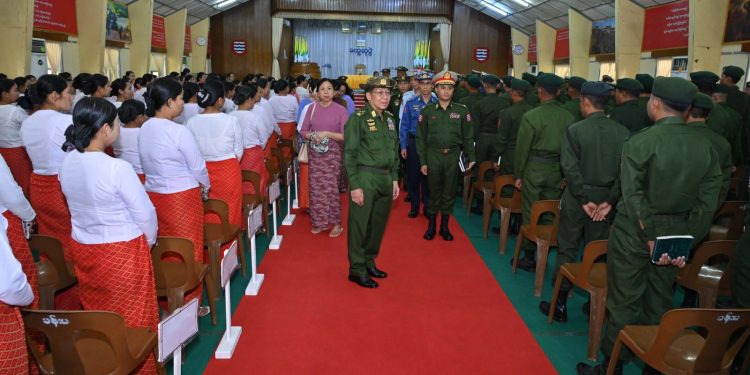With ethnic armies making sweeping gains in northern Shan State, as well as Karenni (Kayah), Chin, Karen and Rakhine states, junta boss Min Aung Hlaing’s public comments regarding his regime’s proposed election and his promises of a power transfer have become more frequent.
As he met military personnel and their families in Pathein in Ayeyarwady Region, overseen by Southwestern Command, on Saturday, Min Aung Hlaing said he was laying the groundwork for the poll, and would hand over power to the party that wins.
Min Aung Hlaing accused the ethnic Brotherhood Alliance of derailing his plans for the election with its attacks. In comments filled with bitterness and humiliation, the junta boss alleged that the tripartite military alliance was attempting to “take a short cut to seize power instead of [using] legal means while the country is practicing a multi-party democracy system.” The statement is ironic given that it was he who first took such a “short cut” by seizing power.
When he met political parties on Jan. 6, he accused ethnic armed organizations of “taking advantage of the situation” while he is focusing all his energy on “combating COVID-19 and bolstering the national economy.”
Consecutive military defeats have seen Min Aung Hlaing discussing the vote recently. When he received the special envoy of the Association of Southeast Asian Nations, and new ambassadors from Brazil and Egypt, over the past week, he discussed his regime’s preparations for the poll, and how much the Myanmar military believes in multi-party democratic elections.
Meanwhile, junta-appointed Union Election Commission chairman Thein Soe met the Russian Ambassador in Naypyitaw for talks focusing on increased cooperation between the election bodies of the two countries.
The state of emergency initially declared in February 2021 when the military ousted the democratically elected government will end at the end of this month. The country’s constitution states that an emergency can be declared for an initial period of one year and can “normally” be extended for a maximum of two half-year terms at the discretion of the military-dominated National Defense and Security Council (NDSC).
However, Min Aung Hlaing has unconstitutionally extended the emergency twice, citing the “extraordinary situation” that has arisen due to the armed resistance against the regime. It is likely that Min Aung Hlaing will extend the emergency. Otherwise, he must hand power back to the NDSC, and a poll must be held within six months, according to the army-drafted constitution.
Before the anti-regime offensive Operation 1027 was launched in late October, Min Aung Hlaing said the poll would be held after the national census, which is expected to be complete around the end of 2024. Political observers therefore suggested the regime would hold the vote in 2025 if things proceeded according to its plan.
Min Aung Hlaing has often said the election would be held across Myanmar. However, the regime has already lost control of some 30 towns, and is struggling to defend several others from resistance attacks. For now, it appears the regime might not be able to conduct the census, let alone hold a poll. In fact, Min Aung Hlaing has not even been able to fix a date for the proposed poll, despite his promise of a power transfer.

















